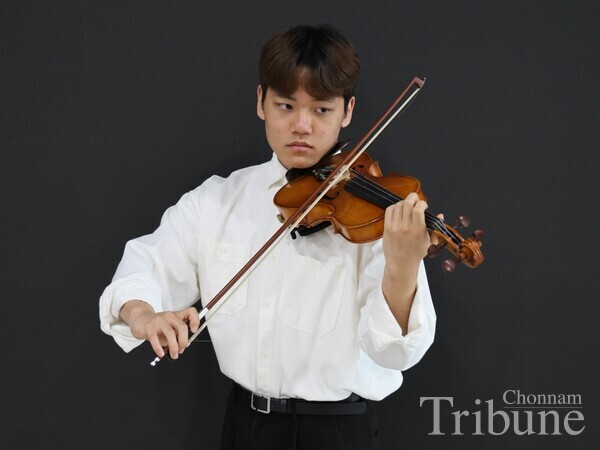
Recent advances in artificial intelligence (AI) are encroaching on areas long considered the exclusive domain of human activity. People no longer need skilled artisans to create images tailored for specific needs. Instead, people now use fine-tuned AI systems to generate original images, audio, and video. However, this shift has little to do with the deeper human need for artistic expression, which is rooted in our sensory and emotional experience. As a means of conveying and evoking personal perception and feeling, art allows us to experience and express the world in vivid and diverse ways. Chonnam National University (CNU) offers a range of courses that help students appreciate both contemporary and historic forms of art, while also helping them develop their ability to create their own profound work in forms both old and new. Another venue for students to express themselves exists in student clubs, where most members are from non-artistic majors but still engage in ongoing artistic creation. In this issue, the Chonnam Tribune explores arts education at CNU as well as students’ artistic club activities, exploring the dynamic interplay between creation and appreciation.
The Power of Artistic Experiences
The arts offer a unique form of pleasure and emotional resonance, connecting through sensory and emotional engagement rather than relying on verbal or logical discourse. When encountering an artwork, one may experience a sense of immersion—a fleeting yet powerful shift from everyday reality into a state of focused attention where distractions fade. This heightened awareness can deepen one’s connection to the world, reveal new perspectives, and enrich the overall experience.
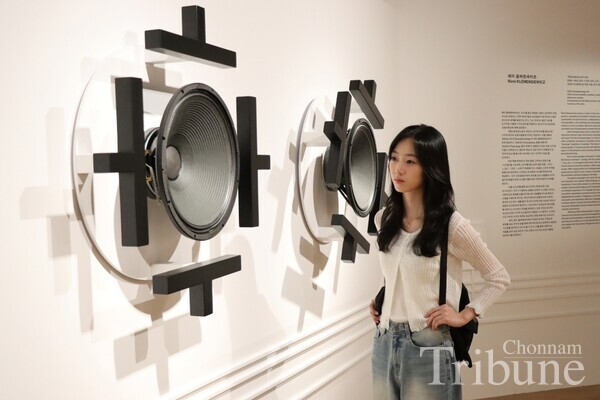
Artists create imaginative encounters that often distill reality, presenting life in intensified, more revealing, or meaningful ways. These experiences can evoke a deep sense of fulfillment, even in works that are unsettling, tragic, or complex, as their emotional depth goes beyond surface-level enjoyment. Beyond personal enrichment, the arts also play a vital role in fostering community empathy and cohesion. Shared experiences, whether through discussing artwork or participating in communal events, help build meaningful social bonds grounded in mutual emotional and intellectual engagement. This social value is distinct from the more pragmatic, instrumental outcomes that are often attributed to the arts.
Furthermore, collaborative performance-based activities highlight how aesthetic experiences can generate emergent properties within groups. With a shared purpose, individual talents come together to form unified creative endeavors. This synergy not only elevates collective creativity and performance quality but also strengthens social bonds.
Arts Education at CNU
As part of the liberal arts program, CNU offers courses that are designed to nurture interdisciplinary skills among students. Within this framework, art plays a fundamental role in maintaining balance across diverse academic disciplines. To support this goal, a wide variety of courses are offered by individual departments and the Office of Education Innovation.
Among them, “Artistic Sensibility and Aesthetics” is one of the most popular, with eight sections offered this semester. This course aims to help students understand how art has evolved in response to societal and cultural shifts. Lee Hye-ran, this course’s lecturer, explained, “Students are able to understand the flow and context of artistic development, which deepens their appreciation of modern art. I hope they come to understand that art does not exist in isolation but is deeply intertwined with the changes in our lives.”
Shin Hyun-ji (Sophomore, Dept. of Dentistry) commented, “It was fascinating to see art from a fresh perspective. I was able to hear the stories and the context behind the artwork’s creation. During the group discussion, I was astonished by the variety of perspectives on the same painting.”
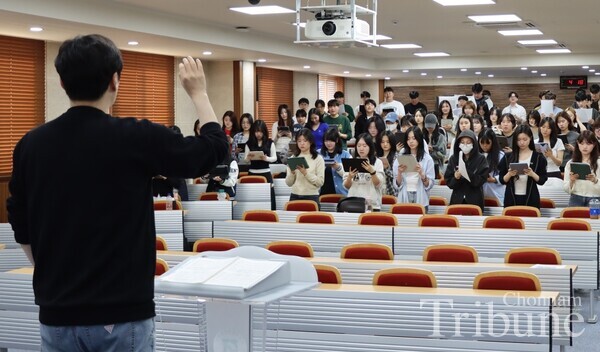
“Choral Discovery” is another popular general elective course among students. Launched in 2022 with only 30 students, it has grown to 100 students due to high demand and limited enrollment capacity. The course focuses on noncompetitive achievement through group singing. Students are encouraged to sing out loud regardless of skill level and to see themselves as contributors rather than hindrances. Instead of a written exam, the course culminates in a public performance. This semester, their concerts will be held on June 11 and 13.
Bang Dae-jin (Professor, Dept. of Music Education), who facilitates this course, hopes students feel liberated through chorus. He said, “I encourage students to discover their own voices, to sing and speak out with confidence. Through choral singing, students can experience self-acceptance, self-approval, and even self-love.” Instead of being taught, these concepts are learned through heartfelt and lived experience.
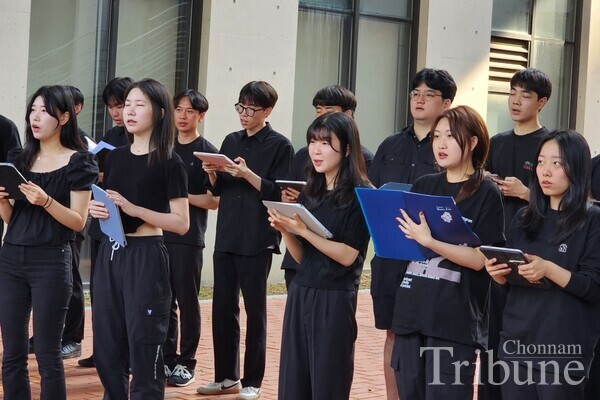
Chorus, by its very nature, is about harmony, something that cannot be achieved through a single outstanding performance. As students sing together, they discover the beauty that emerges when distinct melodies blend into a unified whole. Moon Si-eun (Sophomore, Dept. of English Language and Literature), who took the course last semester and is now volunteering as a teaching assistant, shared her experience, “I was deeply moved when the song reached its climax during our final performance. The act of revealing all I had prepared stirred something within me—a feeling I hope to help recreate for my peers through this immersive process.”
Artistic Club Activities
CNU currently has 82 officially registered clubs, 24 of which are classified under the arts and culture sector. Proponents of these clubs note that participation in artistic performance is believed to enhance self-efficacy by fulfilling the need for creative expression and fostering social bonds within an intimate community.
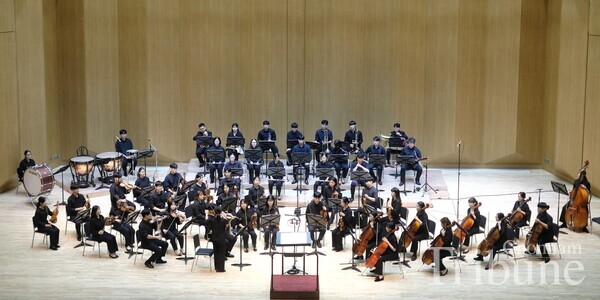
The Chonnam National University Orchestra (CNUO) is one of these clubs, composed of students who play string and wind instruments. The club endeavors to hold two concerts each year. The March concert features accessible music, such as movie soundtracks, while the annual regular concert, held in September, showcases symphonies—a hallmark of orchestral music. According to Oh Su-hyeon (Senior, Dept. of Biological Sciences and Technology), president of CNUO, achieving harmony relies foremost on participants’ alignment. She said, “We should communicate about which parts are currently asynchronous and remain open to feedback. This is more effectively done in a relaxed atmosphere, making the bond between members essential.”
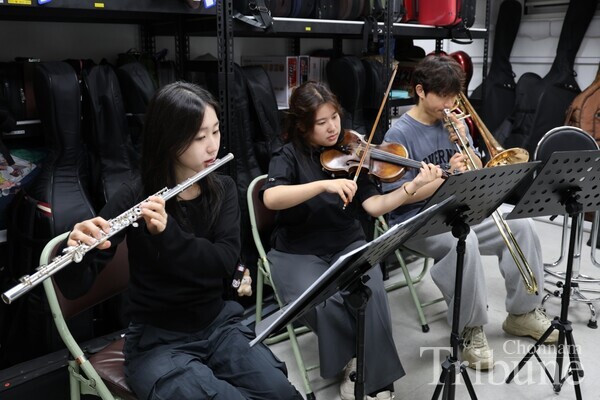
The effect of coherence extends beyond achieving a better outcome. Strong friendships are formed, and students gain companions who share common interests. She emphasized the relationship she developed with fellow members, saying, “I have gained invaluable connections through the experience of aligning our opinions. Even when situations become tense, trust in one another leads to mutual understanding.”
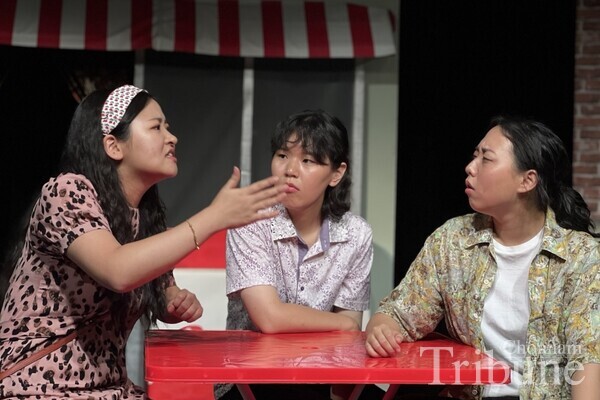
The JNU Drama Club is a student society dedicated to theater. The club stages two plays each year, typically held in February and August. Each production involves two months of detailed reparation. With experienced members guiding new members and through careful coordination, they achieve successful results. Hwang In-gyu (Junior, Dept. of Molecular Biotechnology), president of JNU Drama Club, shared how his love for the club evolved into a deeper interest in drama itself. He said, “In my first year, I took part in producing a play on stage because of the fellowship I felt with my fellow members. However, with continued participation, I developed a desire to produce better performances. Now, I enjoy staging plays and have acquired a strong sense of responsibility for production.”
Staging a play is a demanding mission that involves numerous tasks from casting roles to script development and constant rehearsals. Nonetheless, he remarked, “Drama can still be enjoyed light-heartedly. I hope more people experience the immense enjoyment and satisfaction that theater offers.”
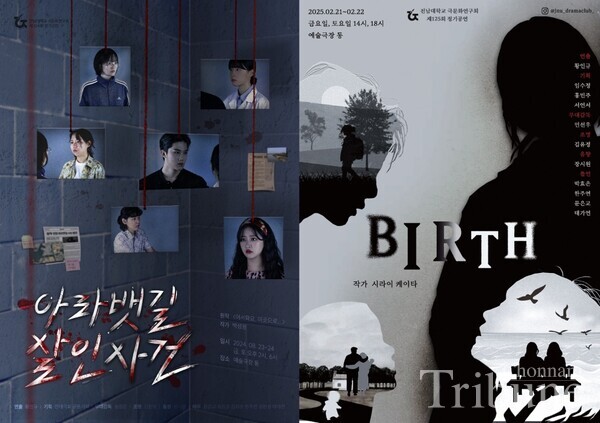
Enhancing Students’ Engagement with Arts and Culture
Arts and culture not only expand a person’s emotional and creative capacities but also promote communication and empathy in relationships. Therefore, engaging in arts and culture education and activities offers numerous benefits. Recent academic research highlights that arts education and artistic activities positively impact cognitive development and contribute to enhance students’ academic performance, as well as improving quality of life through helping individuals manage their own health more proactively. It has also been reported that exposure to the arts improves individuals’ health and wellbeing and even occasional participation can confer a range of significant benefits.
Despite the multifaceted benefits of engaging with the arts, there has been a gradual decline in performance-based participatory arts education at CNU. Understanding of Musical Theater is no longer offered this semester due to the instructor’s contract termination. This reduction in course offerings is having an impact on the diversity and depth of opportunities available for artistic education. Such courses offer essential opportunities for students to develop originality, self-expression, and a sense of community through hands-on creation and collaboration, rather than merely appreciating the arts as bystanders.
To preserve these courses, university-level institutional support and budget security are crucial. While it is commendable that arts and culture clubs can use university-provided spaces without rental fees, these spaces are insufficient to accommodate the growing number of participating students, which limit their range of activities. Therefore, improving infrastructure, including expanding space for art clubs, should be a priority. To help more students experience the value of the arts, both active student participation and continued university support are essential.
By Yun Hyun-ji, Editor
